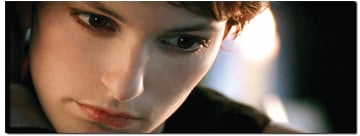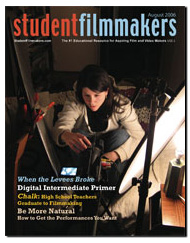Check out this
article in the print edition of StudentFilmmakers
Magazine, August
2006. More photos in the print version, including
production stills, scenes from the film, and storyboard sketches.
Subscribe
to the Magazine Today!
Interview with Director Phillip Van
The Making of "High Maintenance"
...
Continued from Preview Page
I got into a few graduate film schools that I had always admired
and was overjoyed but a little overwhelmed trying to make a decision
between them. I was picking between NYU, Columbia, USC and UCLA.
One of the incredible things that separated NYU from the other
schools was that they chose a widely diverse, extremely intelligent
group of people per class. Don�t get me wrong, the other schools
have an amazing and diverse student body, but NYU�s range of diversity
was something I had never before experienced. And I come from
a very multi-cultural background. I�m Greek American and Vietnamese.
My father is a refugee from Vietnam and a taxi driver and my mother
was raised in a Greek community in Chicago and is now a supervisor
at Keiser. I was raised in Honolulu and Portland, Oregon.

Scene from "High Maintenance." Jane (Nicolette Krebitz)
makes a crucial decision about Paul, her unloving husband. Image
by Felix Novo De Oliveira.
Even in coming from this background, NYU was on another level.
And that may sound isolating, but it wasn�t. It was eye opening
and definitional. And I firmly believe it has made me a stronger
filmmaker and as cheesy as it sounds, a better person. There is
not a culture, type, ethos or work ethic that you don�t encounter
in NYU�s film program. What really teaches you about these people,
is that you are thrown into highly technical, often stressful
situations with them. You grow with them through a struggle against
money and time in the name of your passion and art. And that�s
something that transfers right into the industry.
Do you feel that film school has hindered you in any way?
I don�t, because I have been able to do everything that I would
have wanted to do outside of film school within film school. In
other words, I got to work while I was in film school. My professors
and the faculty were in complete understanding when I had jobs
come up, whether it was shooting a narrative film or for a company
like Kenneth Cole or Macy�s. They would give me time off class
and understood that it was a part of my education as much as coming
to school.
I got to use all of the school�s facilities, so I could edit,
I could take out grip and electric gear, use the sound stage.
You can get better deals at rental houses because you�re a student.
NYU believed in my work and I was on significant scholarships
and finally a full ride dean�s fellowship. And the students in
my class are some of my greatest collaborators. So no, I can�t
think of any disadvantage. I wouldn�t take back the experience
at all.
What are you working on next?
I�m writing a feature version of �High Maintenance� with Simon
Biggs, the writer of the short, from Scotland. I�m also working
on another feature script and a pilot. And I�m always shooting.
What advice would you give to beginner filmmakers?
Know yourself. This isn�t a Zen theory. It�s practical. Find meaning
in what you do, and make sure that it�s meaningful to you first.
Don�t do things just to satisfy other people. It sounds contradictory,
but this is the best way to understand and expand your audience.
If you were the one sitting in the theatre, and this thing came
up, and you didn�t know who made it or where it came from, but
it happened to be your film, the way that you watch that film
is the most telling thing of all. Take into consideration the
advice of others, especially those with experience and taste,
but don�t forget that perspective. And if you can satisfy that
audience member, that spectator who happens to be yourself, you
will be making a film that many other people will want to watch,
it�s almost guaranteed.
Learn how to work with all types of people. The more that you�re
comfortable with every type of person that you could imagine,
the more you can get in sync with them creatively and professionally,
the better you�re going to be on set, and the better you�re going
to be in every stage of filmmaking.
The amount of creative insight, advice and opinions that a team
of people can give you is not to be underestimated. It could make
or break the film. One of the biggest parts of directing and making
films is having a strong personal vision, but also learning to
accept, appreciate and to use anything that comes at you that
is truly good. Don�t let your ego get in the way. It�s critical
that you�re open all the time to new ideas and inspiration.
This article may not be reprinted in print
or internet publications without express permission of StudentFilmmakers.com.
Photos may not be copied or reproduced.
Check out this article in the August 2006
print edition of StudentFilmmakers magazine, pages
30-34. Click here to get a copy of the August 2006
Edition, so you can read and enjoy all of the excellent articles
inside.

Resources:
About
StudentFilmmakers Magazine & StudentFilmmakers.com
>>
Join
the Film and Digital Networking Community >>
Post
Your Films, Videos, Reels, and Trailers >>
Discuss
Motion Picture Techniques in the Online Industry Forums >>
Get
the StudentFilmmakers.com E-Newsletter >>
Subscribe
to the Magazine >>
StudentFilmmakers magazine would like to hear
from you!
Click here
to share your comments and feedback about the magazine,
monthly editions, your favorite articles, and your favorite topics.
We always welcome and appreciate your Reader Comments.
View them here, and send yours to the editorial
team today!
|

